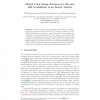Free Online Productivity Tools
i2Speak
i2Symbol
i2OCR
iTex2Img
iWeb2Print
iWeb2Shot
i2Type
iPdf2Split
iPdf2Merge
i2Bopomofo
i2Arabic
i2Style
i2Image
i2PDF
iLatex2Rtf
Sci2ools
124
click to vote
CAIP
2005
Springer
2005
Springer
Global Color Image Features for Discrete Self-localization of an Indoor Vehicle
Abstract. In autonomous indoor navigation some number of localizations and orientations of the vehicle can be learned in advance. No artificial landmarks are required to exist. We describe and compare the detection of several global features of color images (sensor data). This constitutes the measurement process in a self-localization approach that is based on Bayes filtering of a Markov environment - the posterior probability density over possible discrete robot locations (the belief) is recursively computed. The approach was tested to provide robust results under varying scene brightness conditions and small measurement errors.
Autonomous Indoor Navigation | CAIP 2005 | Image Analysis | Posterior Probability Density | Scene Brightness Conditions |
| Added | 13 Oct 2010 |
| Updated | 13 Oct 2010 |
| Type | Conference |
| Year | 2005 |
| Where | CAIP |
| Authors | Wlodzimierz Kasprzak, Ewa Wojciech Szynkiewicz, Mikolaj Karolczak |
Comments (0)

